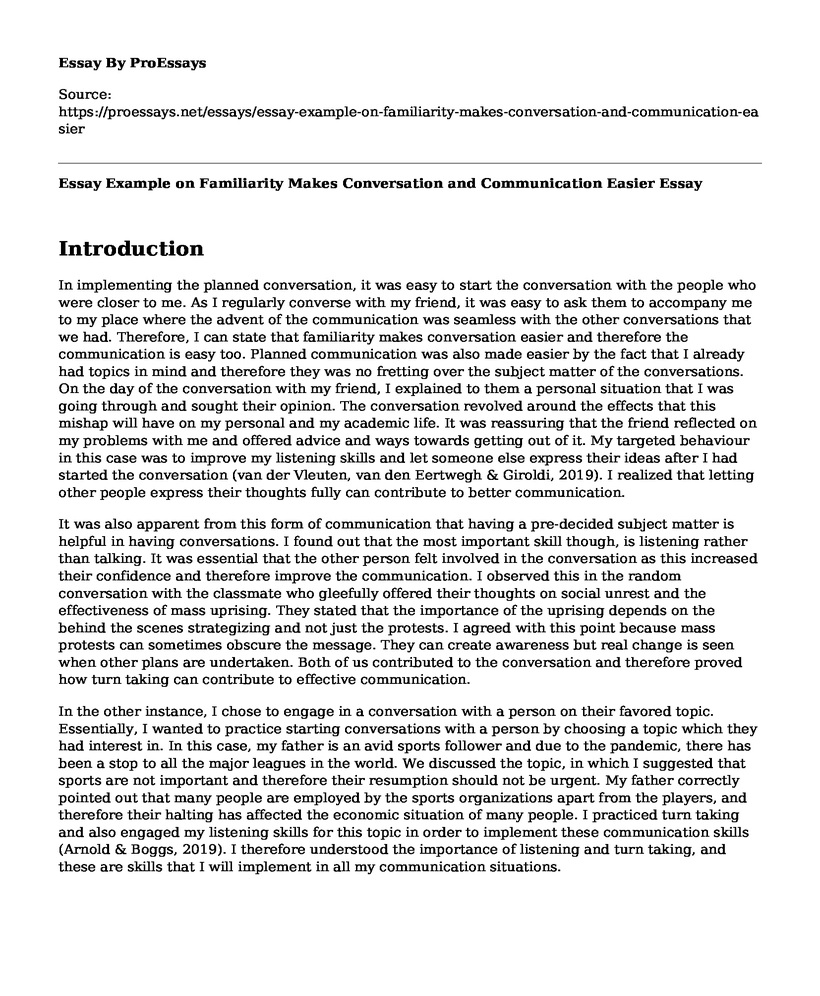Introduction
In implementing the planned conversation, it was easy to start the conversation with the people who were closer to me. As I regularly converse with my friend, it was easy to ask them to accompany me to my place where the advent of the communication was seamless with the other conversations that we had. Therefore, I can state that familiarity makes conversation easier and therefore the communication is easy too. Planned communication was also made easier by the fact that I already had topics in mind and therefore they was no fretting over the subject matter of the conversations. On the day of the conversation with my friend, I explained to them a personal situation that I was going through and sought their opinion. The conversation revolved around the effects that this mishap will have on my personal and my academic life. It was reassuring that the friend reflected on my problems with me and offered advice and ways towards getting out of it. My targeted behaviour in this case was to improve my listening skills and let someone else express their ideas after I had started the conversation (van der Vleuten, van den Eertwegh & Giroldi, 2019). I realized that letting other people express their thoughts fully can contribute to better communication.
It was also apparent from this form of communication that having a pre-decided subject matter is helpful in having conversations. I found out that the most important skill though, is listening rather than talking. It was essential that the other person felt involved in the conversation as this increased their confidence and therefore improve the communication. I observed this in the random conversation with the classmate who gleefully offered their thoughts on social unrest and the effectiveness of mass uprising. They stated that the importance of the uprising depends on the behind the scenes strategizing and not just the protests. I agreed with this point because mass protests can sometimes obscure the message. They can create awareness but real change is seen when other plans are undertaken. Both of us contributed to the conversation and therefore proved how turn taking can contribute to effective communication.
In the other instance, I chose to engage in a conversation with a person on their favored topic. Essentially, I wanted to practice starting conversations with a person by choosing a topic which they had interest in. In this case, my father is an avid sports follower and due to the pandemic, there has been a stop to all the major leagues in the world. We discussed the topic, in which I suggested that sports are not important and therefore their resumption should not be urgent. My father correctly pointed out that many people are employed by the sports organizations apart from the players, and therefore their halting has affected the economic situation of many people. I practiced turn taking and also engaged my listening skills for this topic in order to implement these communication skills (Arnold & Boggs, 2019). I therefore understood the importance of listening and turn taking, and these are skills that I will implement in all my communication situations.
Evaluation of Unplanned Conversations
An unplanned conversation occurred in a cab as I was going to school. I decide to start the conversation with the cab driver on the how they are managing their protection against the coronavirus. In this unplanned situation, I decided to implement the strategies of turn taking and listening to the other person. In this case, I decided to engage the driver in this matter because it was current and relevant. The cab driver said that he is following the government directive of disinfection and minimizing contact between him and his passengers. I realized that in an unplanned situation, I cannot contribute mostly due to the fear of over-engaging and therefore I did not gather a lot of information. I therefore plan to work on having conversations without the fear of being overly engaging. I would like to be involved in an unplanned conversation with a stranger again and cultivate it based on relevant matters such as pandemics and health.
References
Arnold, E. C., & Boggs, K. U. (2019). Interpersonal Relationships E-Book: Professional Communication Skills for Nurses. Elsevier Health Sciences.
van der Vleuten, C., van den Eertwegh, V., & Giroldi, E. (2019). Assessment of communication skills. Patient Education and Counseling, 102(11), 2110-2113.
Cite this page
Essay Example on Familiarity Makes Conversation and Communication Easier. (2023, Sep 03). Retrieved from https://proessays.net/essays/essay-example-on-familiarity-makes-conversation-and-communication-easier
If you are the original author of this essay and no longer wish to have it published on the ProEssays website, please click below to request its removal:
- Essay Sample on Twin and Adoption Studies and Child's Birth Defect
- Famous Teen Counseling: The Teen Star Paper Example
- Essay Sample on Building a Multi-Racial Society
- Essay Sample on Interpersonal Problems Among College Students: Increasing Rates & Solutions
- Essay Example on Healthy Competition: Benefits, Types, & Customer Relationships
- Australia: Individualism vs Collectivism in Business Context - Free Paper
- Essay Sample on Ethics and Morality: Crucial Aspects of Individuals in Society







